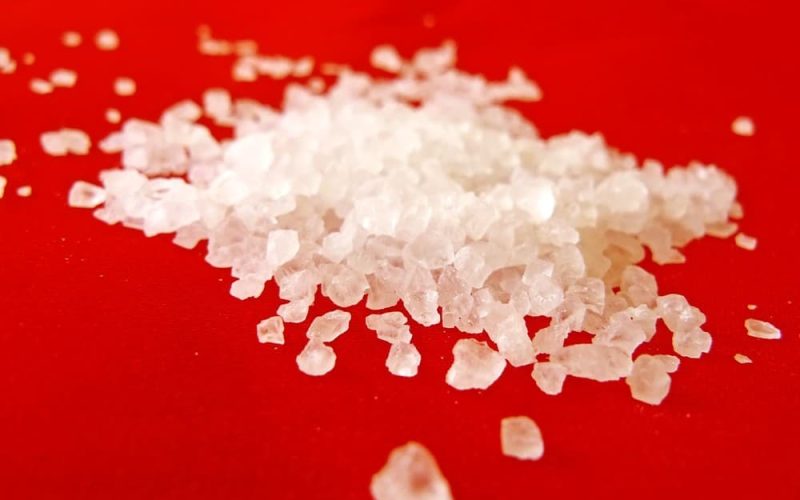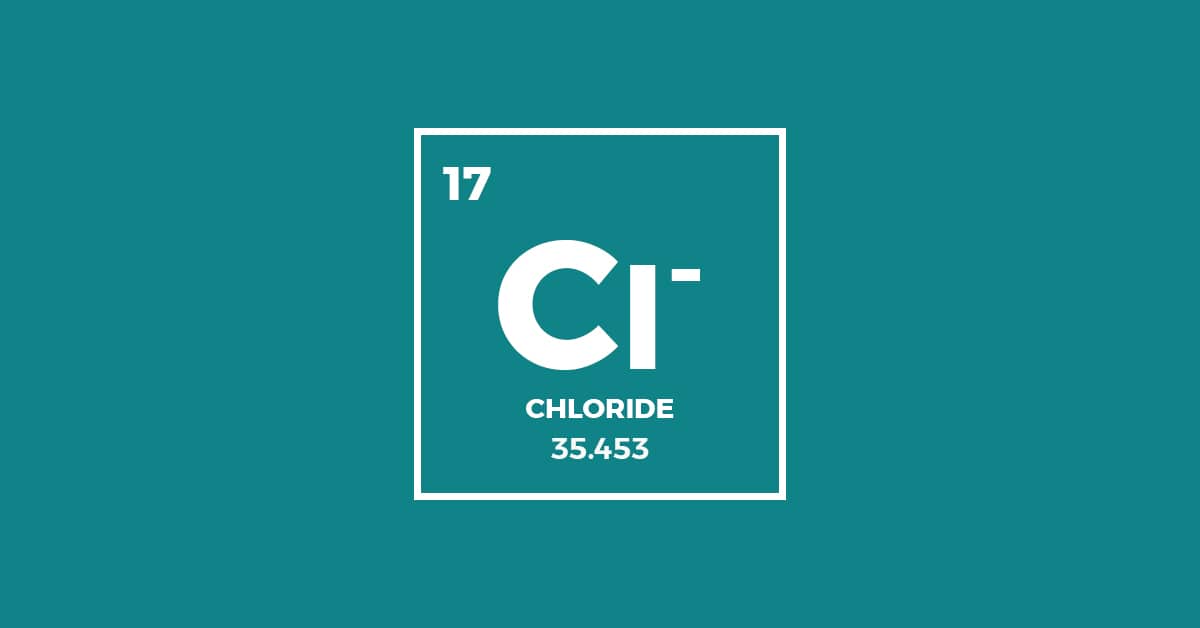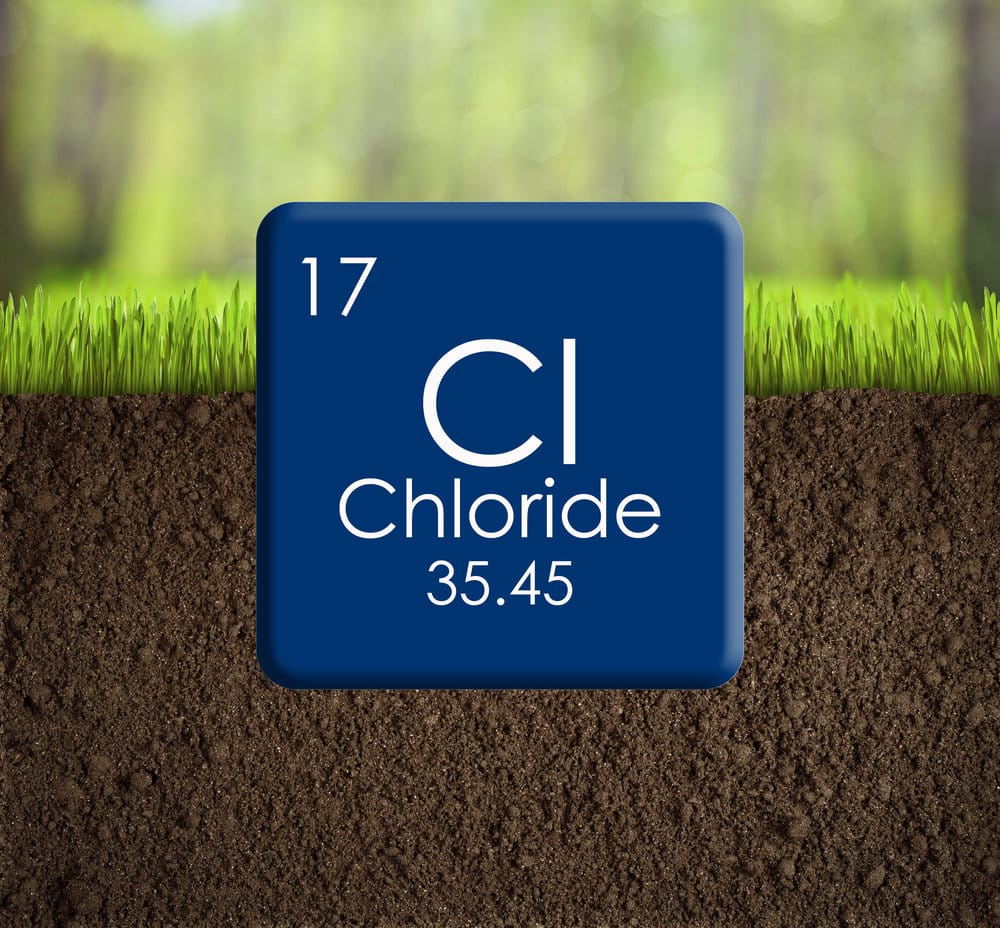Have you heard of chlorine? The form it exists in the body is known as chloride. Chloride is an important electrolyte in your bloodstream. It keeps the amount of fluid inside and outside your cells in balance. Chloride also maintains proper blood volume.
This important electrolyte and essential mineral also maintain blood pressure and the pH of the fluids in your body. Chloride is also the primary anion in extracellular fluid. It also has its own protein channels in the cell membranes.
0.15% of your body weight is made up of chloride. This is around 115 grams in an average adult. 15% of the chloride in your body is found inside your cells. The highest amount is found in your red blood cells.
Chloride is also found in little amounts in your bones. 70% of the total negative ion in your body is chloride. When dissolved in water, chloride along with sodium and potassium take part in the conduction of electrical impulses in the body.
Most of the chloride in your body is supplied by salt and it is easily absorbed by your intestines. Extra chloride in your body is excreted via urine. Below are some of the health benefits of chloride.
Health Benefits of Chloride
Maintains fluid balance
Chloride takes part in maintaining the balance of fluid in the body alongside sodium. It also maintains charge neutrality. There are chloride channels in the body and they are involved in regulating the secretion of fluids.
Examples are the secretion of pancreatic juice into the small intestine and the flow of water into mucus. Fluids and mucus are important for many life processes. Without them, the body cannot function effectively.
Boosts digestion
Chloride forms a part of an important digestive enzyme in the stomach called hydrochloric acid. This enzyme effectively breaks down food into smaller forms that the body can absorb and use.
Chloride also helps strengthen your overall digestive system.
Improves physical health
Chloride enhances your physical health in a dynamic manner. It accelerates physical fitness, enhances stamina, and improves the systemic functions of your muscles.
Chloride is also a neutralizing agent, it neutralizes toxins and also reduces the levels of acid and base in the body thereby maintaining a healthy balance.
Boosts the nervous system
Alongside sodium and potassium, chloride helps in transporting electrical impulses through the body. Nervous electrical potential is propagated when negatively charged chloride ion moves.
Maintains acid-base balance
Your body maintains blood pH in a narrow range and it always ensures that the number of positively charged substances is equal to that of negatively charged substances.
Chloride forms many compounds in the body that help in maintaining this balance. Some of them are: bicarbonates and chloride ions used in maintain blood pH and they are negatively charged.
We have hydrochloric acid, which is made up of chlorine and hydrogen. This gastric acid helps in digesting food and also prevents the growth of pathogens and unwanted microbes in the stomach.
Your immune system depends on chloride to kill germs, your red blood cells use chloride ions to remove excess carbondioxide from the body. Chloride has many important functions in the body.
Enhances metabolism
Chloride is absorbed from the intestine after digestion where it controls metabolism in the body. It makes metabolism better and helps the liver in its cleansing process.
Chloride boosts metabolism by actively helping to remove waste products from the body. A clogged system and a body where waste and toxins accumulate leads to slow metabolism and this can cause a whole lot of health complications.
Recommended Amount of Chloride for Different Age Group
| Age Groups | Mg/day |
| Infants (<6 months) | 180 |
| Infants (>6 months) | 570 |
| Little children (1 – 3 years) | 1,500 |
| Children (4 – 6 years) | 1,900 |
| Children (9 – 13 years) | 2,300 |
| Adolescents (14 – 18 years) | 2,300 |
| Adults (19 – 50 years) | 2,300 |
| Adults (51 – 70 years) | 2,000 |
| Adults above 70 years old | 1,800 |
Dietary Sources of Chloride
The most common source of chloride is table salt (sodium chloride). Even salt substitutes labeled chloride-free contains a little amount of chloride.
Other forms of salt like potassium chloride also supply chloride. Some mineral supplements also contain chloride.
Food sources of chloride are olives, whole grain, tomatoes, seafood, yeast extract, lettuce, rye, and celery. All foods containing sodium chloride contains chloride.
Signs and symptoms of Chloride Imbalances in the Body
Signs of low chloride in the body (hypochloremia):
Diarrhea and low intake of chloride can cause low levels of chloride in the body. The symptoms of low chloride in the body are:
- Headaches
- Loss of appetite
- Nausea
- Dehydration
- Weakness
- Alkalosis (excess base in the body).
Severe chloride deficiency can lead to:
- Cramps in the nerves and muscles
- Irregular heart rate
- Confusion
- Apathy
- And other symptoms of metabolic alkalosis like slow metabolism and accumulation of CO2 in the body.
Excess chloride in the body is rare since it is easily excreted through the urine. And even if you have excess chloride in your body, it rarely gives any sign or symptom.
Excessive chloride in the body can be caused by high intake of sodium chloride (table salt), or potassium chloride, reduced production and excretion of urine due to some health conditions like kidney problems, gastritis, and cancer, intake of certain medications, and dehydration.
Chloride imbalance in the body is associated with genetic disorders. The most common is cystic fibrosis. Below are some genetic disorders associated with low levels of chloride.
Cystic fibrosis
Although an inherited disorder common among the people of European descent, it is caused by a mutation in the protein responsible for transporting chloride ions out of the cells.
The signs and symptoms of cystic fibrosis are poor digestion and absorption of foods, this will indirectly lead to poor growth and development.
Other signs are the accumulation of sticky mucus in the lungs, this will make you susceptible to respiratory infections. Cystic fibrosis also causes infertility, liver damage, and salty skin.
Causes of Low Chloride Levels in the Body
Chloride can be lost in many ways in the body. The main ways are as follows:
Kidney disorders
Excess amounts of chloride are usually excreted through the kidneys. However, chloride deficiency can occur if most of the chloride in the body is excreted through the kidneys.
There are some conditions that can make the kidneys excrete excess amounts of chloride. Some of them are:
- Excessive levels of aldosterone in the blood
- High levels of carbondioxide in the blood
- Increased intake of bicarbonate
- Gitelman syndrome, Bartter’s syndrome, and other genetic defects of the electrolyte channels in the kidneys.
- Excessive use of diuretics
Insufficient intake of chloride
The minimum daily intake of chloride is 2.3 grams. Although fluoride malnutrition is rare, it can still happen especially when you don’t take in chloride.
Eating foods with low chloride levels can cause the amount of chloride in your body to fall over time. This can even lead to metabolic alkalosis.
Digestive disorders
Chloride can be lost when there are problems in the digestive system. Some problems in the digestive system that can cause chloride loss are:
- McKittrick-Wheelock syndrome (a condition in which tumors secrete substances in the bowel.
- Watery diarrhea and frequent vomiting
- When the opening of the stomach into the bowel is narrowed
- Abuse of laxatives
- Ileostomy (Narrowing of the opening of the stomach into the bowel).
- Stomach pumping
Excess intake of fluids
Excess intake of fluids reduces the concentration of electrolytes in the body. This is why it’s nice to add herbal teas, homemade fruit juices, and vegetable smoothies to your diet.
They also hydrate and supply your body with electrolytes. Drinking the right kind of water is also important. Anorexic people who drink large amounts of water are at high risks of potassium, sodium, and chloride deficiency.
They are also prone to headaches, seizures, and vomiting. Also, people with medical conditions that retain large amounts of water in their bodies like congestive heart failure can develop low chloride. They also develop resistance to diuretics.
Electrolyte imbalance
The concentration of positively charged electrolytes must be equal to that of negatively charged electrolytes in the bloodstream.
And the conditions that cause the loss of sodium and potassium also cause loss of chloride and this can lead to imbalances which can cause health problems.
Metabolic alkalosis
This is a medical condition characterized by high pH. This can be caused by the loss of hydrogen ions, the decrease in the excretion of bicarbonate, and the increased production or intake of bicarbonate.
Some reasons why metabolic acidosis occurs are:
- Excessive intake of antacids
- Kidney disorders that affect the excretion of HCO3-
- Medications that increase the excretion of hydrogen ions, e.g. diuretics
- Vomiting
- Dehydration
Other causes of low chloride levels are:
- Excessive loss of fluid/dehydration
- Tetany ( a condition triggered by low calcium in the bloodstream and characterized by spasms in the voice box, hands, feet, cramps, and even overactive neurological reflexes.
- Hyponatremia (A condition characterized by low sodium in the blood).
- Muscle weakness and spasticity
- High fever and sweating
- Short and shallow breathing
References;











